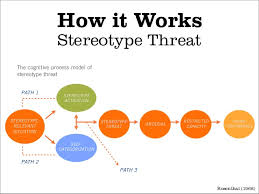The Future Leaders headship programme does not know what it has let itself in for: the pre-reading for Weekend 1 has already sparked the raging Sociologist within me! The stimulus of such passion this evening is Claude M. Steele (Stanford University) and Joshua Aronson’s (University of Texas) fascinating study on ‘Stereotype Threat and the Intellectual Test Performance of African Americans’ (1995).
Steele and Aronson have opened my eyes to the subtle, deeply embedded impact of labelling leading to a self-fulfilling prophecy, particularly among BME students. From the four rigorous studies they conducted on this issue, their key findings were:
- When students were deliberately told that a set of questions was a test of their intellectual ability, black students performed worse than white students; however, where students were told that the questions were a means to investigate the psychology behind solving problems, black students matched the performance of white students
- Under the test condition, black students put in more effort than white students (re-reading the texts) but still underperformed.
- When told it was an assessment of ability, all students completed less questions less accurately; however, black students still completed fewer questions that white students. When not told it was an assessment of ability, black students did not complete less questions that white students. Therefore, black students appeared to assimilate the added pressure of stereotype threat to the already existing pressure of the test.
- Black students feel the stereotype threat in the form of racial stereotypes about the cognitive and intellectual abilities of young black students, which they often link to negative images of black culture in the media (for example, mostly being good at sport when the research showed that they actually valued sports less); they become immediately conscious of the stereotype threat when faced with an assessment of their ability which leads to an impairment of their performance.
- When given tasks that implied thinking about racial identity, this immediately triggered a sense of stereotype threat in black students.
- When feeling that they were being assessed for ability, black students would try to avoid conforming to stereotypical images more than other groups.
- The simple act of recording their race on a document (something they felt they often have to do) triggered the stereotype threat.
What could this mean for schools? Just some general thoughts:
- Is there significance in the kinds of texts we expose students to? Do they reinforce stereotypes e.g. Curley in Of Mice and Men. Just as we did with the reform of gender images in textbooks and educational materials in the 70s and 80s, do we need to consider the same for racial stereotypes?
- What can we do as teachers on a daily basis to be more conscious of the underlying, subtle assumptions that influence our expectations of BME students?
- How do we boost the confidence of BME students to avoid triggering the sense of stereotype threat when faced with a test of their ability?
- What if we removed the pressure of assessing ‘ability’? All students would perform better but would under performing BME students even more so when the stereotype threat triggered by ability-testing is removed, thereby closing the gap?
- As a sidebar, does this research also support the growing debate that evaluating teachers by ability, i.e. through lesson grading, does more harm than good?
I definitely do not have the answers yet but I look forward to trying to find out with the other Future Leaders this weekend.
See full paper here:


Interesting read. As a black person I have always added additional pressure. ..always believed that it would be 10 times harder. But if we can remove the stereotypes for our children, I think they will have a better chance to succeed.